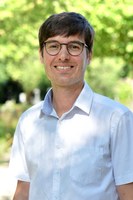Two ERC Starting Grants awarded to University of Freiburg
Freiburg, Nov 22, 2022
Two researchers from the University of Freiburg are each receiving a Starting Grant from the European Research Council (ERC): physicist Dr. Lukas Bruder and psychologist Dr. Bastian Schiller will receive funding of around 1.5 million euros each over five years. The award is one of the most prestigious for research in the European Union. With it, the ERC supports young scientists who are starting an independent career some years after their PhD and want to build up their own work group.
Lukas Bruder: MULTIPLEX project (Multidimensional interferometric photoelectron spectroscopy with extreme ultraviolet photons)
Physicist Dr. Lukas Bruder is receiving an ERC Starting Grant for research into photochemical processes at a molecular level. “Photochemical reactions dominate our lives, so it is extremely relevant to understand these processes in detail,” says Bruder. “However, until now it has been difficult to measure these processes in individual molecules without interruption and at high resolution.”
His MULTIPLEX project (Multidimensional interferometric photoelectron spectroscopy with extreme ultraviolet photons) will develop a new study method enabling photochemical reactions to be measured at exceptionally high resolution and level of detail. This involves preparing individual molecules in an ultrahigh vacuum at very cold temperatures and studying them using extreme ultraviolet photons. The high resolution and high level of detail will be achieved with a new interferometric measurement method.
www.nanophysics.uni-freiburg.de/en/members/lukas-bruder
Bastian Schiller: SODI project (From face-to-face to face-to-screen: Social animals interacting in a digital world)
Psychologist Dr. Bastian Schiller is receiving an ERC Starting Grant for his research into digital social interactions. “Over the course of the pandemic and ongoing digitalization our social contacts are shifting increasingly into the digital space,” says Schiller. “But the psychological and biological differences in face-to-face social interactions and digital interactions are still largely not understood.”
In his SODI project (From face-to-face to face-to-screen: Social animals interacting in a digital world) Schiller uses a multimethod approach which makes use both of experimental psychological interaction paradigms as well as self-reporting, neurophysiological measurements and experimental administration of hormones. “The aim,” explains Schiller, “is to understand the advantages and disadvantages of digital interactions and at the same time research new ways of enriching digital interactions socially, such as with touch, or the presentation of ‘social aromas’.”
www.psychologie.uni-freiburg.de/abteilungen/psychobio/team/schiller
Summary:
- Each in the latest round of European Research Council (ERC) Starting Grants chosen scientist receives a total of up to 1.5 million euros for up to five years.
- Dr. Lukas Bruder researches and teaches at the University of Freiburg Institute of Physics. The focus of his research is in the experimental study of ultrafast molecular processes.
- Dr. Bastian Schiller is a research assistant in the research and teaching area Biological Psychology, Clinical Psychology and Psychotherapy at the Department of Psychology of the University of Freiburg, which is headed by Prof. Dr. Markus Heinrichs. The focus of his research is in the study of the psychobiological principles of (pathological) social interactions.
Press photos for download:
| Lukas Bruder. Photo: Markus Herb | |
 |
Bastian Schiller. Photo: Anna und Alfred Fotografie |
Contact:
Dr. Lukas Bruder
Institute of Physics
University of Freiburg
Tel.: +49 761 203 8405
e-mail: lukas.bruder@physik.uni-freiburg.de
Dr. Bastian Schiller
Department of Psychology
University of Freiburg
Tel.: +49 761 203 97741
e-mail: schiller@psychologie.uni-freiburg.de
Annette Kollefrath-Persch
Office of University and Science Communications
University of Freiburg
Tel.: +49 761 203 8909
e-mail: annette.persch@zv.uni-freiburg.de


